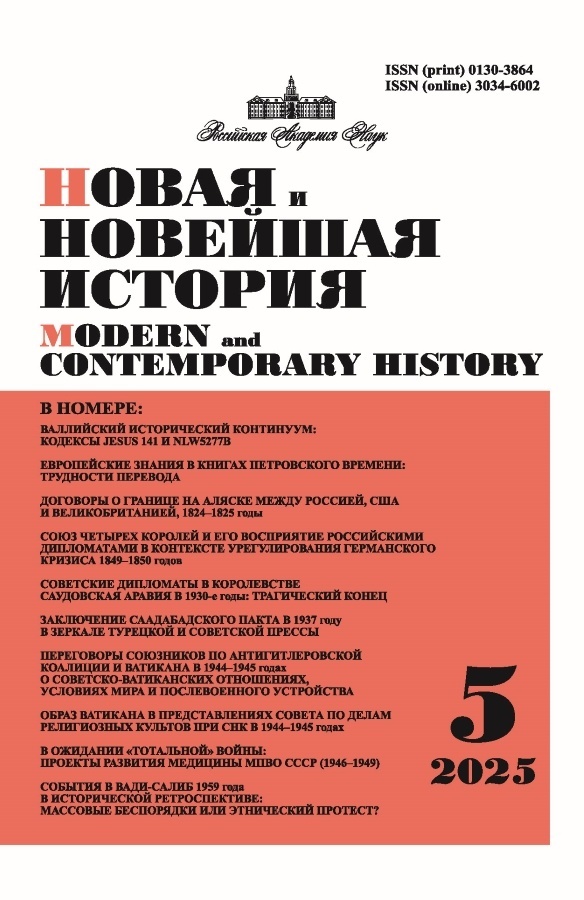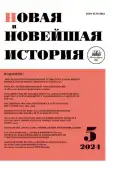The epistemological turn and the episteme of the social in the intellectual discourse of the sixteenth and seventeenth centuries
- Authors: Fyodorov S.E.1
-
Affiliations:
- Saint-Petersburg State University
- Issue: No 5 (2024)
- Pages: 5-17
- Section: Theory and methodology of history
- URL: https://rjsvd.com/0130-3864/article/view/671528
- DOI: https://doi.org/10.31857/S0130386424050019
- ID: 671528
Cite item
Abstract
The article presents a synthesis of the author’s findings on the antiquarian and erudite texts from England, France, and Germany that were produced during the sixteenth and seventeenth centuries. It is demonstrated, for the first time, that European intellectuals’ sustained interest in the construction of individual “fragments” of social reality predetermined the consistent development of certain descriptive schemes for the realisation of this project, initially focusing on the example of various categories of nobility, and subsequently on other social groups. The author places particular emphasis on the accessibility of comprehensive techniques in conjunction with narrative schemes, which are employed in the portrayal and classification of the nobility. Indeed, the author’s argument hinges on the assertion that such techniques facilitated this so-called antiquarian/erudite episteme, which in turn permitted the evaluation of perspectives for the construction and depiction of the “social” during this period. Whereas a new episteme completely transfigured all foregoing workings in understanding of intra- and extra-group communications, what is meant here is an epistemological turn occurred in the Early Modern intellectual discourse. Using various tools of discourse analysis, the author demonstrate, for the first time, that the kernel of the epistemological turn lies in a reinterpreting of a descriptive efficacy of the medieval corporate theory, which viewed all individual and collective agencies as collective or fictitious bodies devoid of personal identity. The new narrative scheme introduced in antiquarian and erudite texts diversified the functional model of social relations relevant to medieval epistemology.
Full Text
About the authors
Sergey E. Fyodorov
Saint-Petersburg State University
Author for correspondence.
Email: s.fedorov@spbu.ru
ORCID iD: 0000-0002-6030-7667
Scopus Author ID: 57196032604
ResearcherId: J-4374-2013
доктор исторических наук, профессор
Russian Federation, Saint-PetersburgReferences
- Fyodorov S.Е. Aristokratiia pri rannikh Stiuartakh [The Aristocracy under the Early Stuarts] (1603–1629). Sankt-Peterburg, 2023. (In Russ.)
- Fyodorov S.Е. Diskussiia ob istinnom blagorodstve i formirovanie sotsial’nykh klassifikatsii znati v antikvarnykh tekstakh XVI–XVII vekov [Debate on the True Nobility and Social Classifications of the Nobility in the Antiquarian Corpora of the 16th–17th Centuries] // Vestnik Sankt-Peterburgskogo universiteta. Istoriia [Bulletin of St. Petersburg University. History]. 2023. T. 68. № 3. S. 712–727. (In Russ.)
- Fyodorov S.Е. Nobilitas v antikvarnom diskurse XVI–XVII vv. i rozhdenie sotsial’nogo [Nobilitas in the 16th–17th Centuries Antiquarian Discourse and Emergence of the Social] // Elektronnyj nauchno-obrazovatel’nyj zhurnal “Istoriya” [Electronic scientific and educational Journal “History”]. 2022. T. 13. № 6 (116). URL: https://history.jes.su/s207987840021843-6-1/ (access date: 15.04.2024). doi: 10.18254/S207987840021843-6 (In Russ.)
- Fyodorov S.Е. Rytsarstvo i titulovannaia znat’ v antikvarnoi episteme XVI–XVII vv. [Knighthood and titled nobility in the antiquarian episteme of the 16th–17th centuries] // Elektronnyj nauchno-obrazovatel’nyj zhurnal “Istoriya” [Electronic scientific and educational Journal “History”]. 2023. T. 14. № 7 (129). URL: https://history.jes.su/s207987840027294-2-1/ (access date: 15.04.2024). doi: 10.18254/S207987840027294-2 (In Russ.)
- Palamarchuk A.A. Geral’dicheskie traktaty v tiudorovskoi i rannestiuartovskoi Anglii [Heraldic Tracts in the Tudor and Stuart England] // Vestnik Sankt-Peterburgskogo universiteta. Istoriia [Bulletin of St. Petersburg University. History]. 2024. T. 69. № 1. S. 89–99. (In Russ.)
- Palamarchuk A.A., Terenteva E.A., Fyodorov S.E. Rozhdenie natsional’nogo istoriopisaniia v Anglii i Frantsii [The Born of the National Historical Writing in England and France]. Sankt-Peterburg, 2021. (In Russ.)
- Palamarchuk A.А. Kontsept “sluzheniia” v rannestiuartovskoi Anglii [The Concept of “Office” in Early Stuart England] // Elektronnyj nauchno-obrazovatel’nyj zhurnal “Istoriya” [Electronic scientific and educational Journal “History”]. 2022. T. 13. № 1 (111). URL: https://history.jes.su/s207987840019000-9-1/ (access date: 15.04.2024). doi: 10.18254/S207987840019000-9 (In Russ.)
- Palamarchuk A.А. Rozhdenie sotsial’noi terminologii v rannestiuartovskoi antikvarnoi traditsii [The Rise of the Social Terminology in the Early Stuart Antiquarian Discourse] // Elektronnyj nauchno-obrazovatel’nyj zhurnal “Istoriya” [Electronic scientific and educational Journal “History”]. 2022. T. 13. № 6 (116). URL: https://history.jes.su/s207987840021758-2-1/ (access date: 15.04.2024). doi: 10.18254/S207987840021758-2 (In Russ.)
- Palamarchuk A.А., Fyodorov S.Е. Antikvarnyi diskurs v rannestiuartovskoi Anglii [The Antiquarian Discourse in the Early Stuart England]. Sankt-Peterburg, 2015. (In Russ.)
- Terenteva E.A. Konstruiruia nobilitet: blagorodnoe soslovie v trudakh frantsuzskikh eruditov [Constructing the nobility: the noble estate in the works of French erudites] // Elektronnyj nauchno-obrazovatel’nyj zhurnal “Istoriya” [Electronic scientific and educational Journal “History”]. 2022. T. 13. № 6 (116). URL: https://history.jes.su/s207987840018884-1-1/ (access date: 15.04.2024). doi: 10.18254/S207987840021781-8 (In Russ.)
- Terenteva E.A. Traktaty o znati i blagorodstve vo Frantsii vtoroi poloviny XVI–XVII vv. [French treatises on nobility in the second half of 16th and in the 17th centuries] // Srednie veka [The Middle Ages]. 2023. Vol. 84. № 4. S. 111–131. doi: 10.7868/S0131878023040062 (In Russ.)
- Becker M.B. Civility and Society in Western Europe, 1300–1600. Bloomington; Indianapolis, 1988.
- Bleeck K., Garber J. Nobilitas: Standes- und Privilegienlegitimation in deutschen Adelstheorien des 16. und 17. Jahrhunderts // Daphnis. 1982. Vol. 11. S. 49–114.
- Broadie A. Notion and Object. Aspects of Late Medieval Epistemology. Oxford, 1989.
- Bryson A. From Courtesy to Civility. Changing Codes of Conduct in Early Modern England. Oxford, 1998.
- Burmeister K.H. Das Studium der Rechte im Zeitalter des Humanismus im deutschen Rechtsbereich. Wiesbaden, 1974.
- Chroust A.-H. The Corporate Idea and the Body Politic in the Middle Ages // The Review of Politics. 1947. Vol. 9. № 4. P. 423–452.
- Coquillette D.R. Legal Ideology and Incorporation I: The English Civilian Writers, 1523–1607 // Boston University Law Review. 1981. Vol. 61. P. 1–89.
- Daltio R. La letteratura delle immagini Emblemi e “imprese” tra Cinque e Seicento. Aosta, 2015.
- Drysdall D.L. Hieroglyphs, Speaking Pictures, and the Law. The context of Alciato’s Emblems. Glasgow, 2013.
- Gilli P. La Noblesse du droit. Débats et controverses sur la culture juridique et le rôle des juristes dans l’Italie médiévale (XIIe–XVe siècles). Paris, 2003.
- Goffman E. Stigma: Notes on the Management of the Spoiled Identity. Englewood Cliffs, 1963.
- Gutzwiller K.J. Poetic Garlands. Hellenistic Epigrams in Context. Los Angeles, 1998.
- Hechter M. Principles of the Group Solidarity. Los Angeles, 1998.
- Identity and Сontrol. How Social Formations Emerge / ed. H.С. White. Princeton, 2008.
- Jouanna A. Le devoir de révolte. La noblesse française et la gestation de l’État moderne: 1559–1661. Paris, 1989.
- Noblesse oblige. Identités et engagements aristocratiques à l’époque moderne / eds N. Le Roux, M. Wrede. Rennes, 2017.
- Passau R. After Certainty. A History of Our Epistemic Ideals and Illusions. Oxford, 2017.
- Passau R. Theories of Cognition in the Later Middle Ages. Cambridge, 1997.
- Pollet C. Définir la noblesse. Ecriture et publication des traités nobiliaires au XVIIe siècle. Angleterre – France – Espagne. Rennes, 2023.
- Waswo R. Language and Meaning in the Renaissance. Princeton, 1987.
- Wieacker F. Gründer und Bewahrer. Rechtslehrer der neueren deutschen Privatrechtsgeschichte. Göttingen, 1959.
Supplementary files











